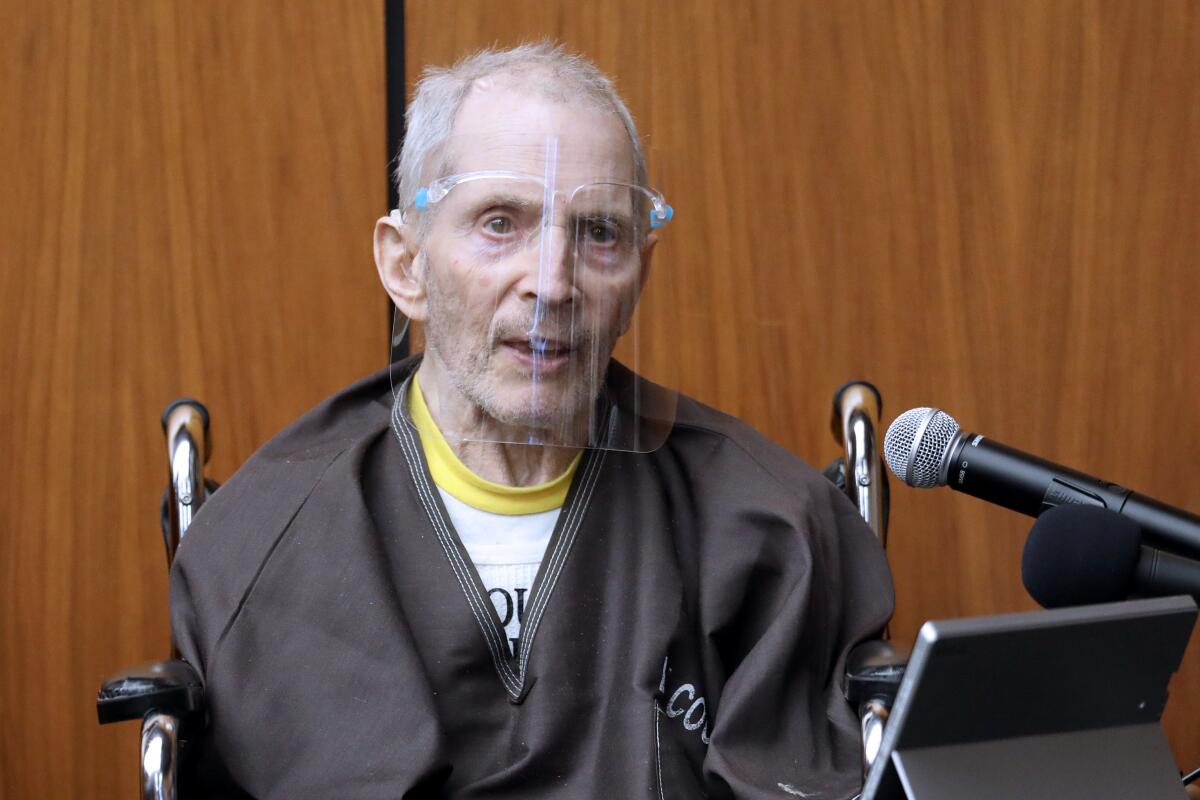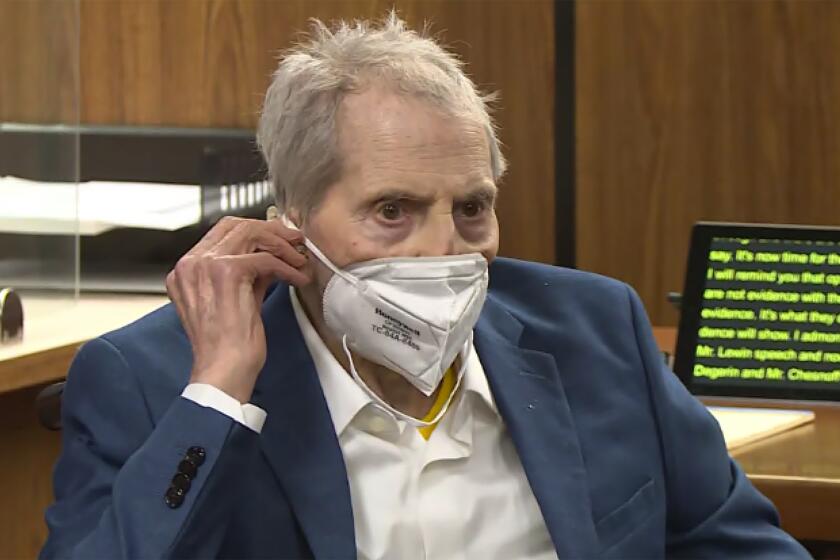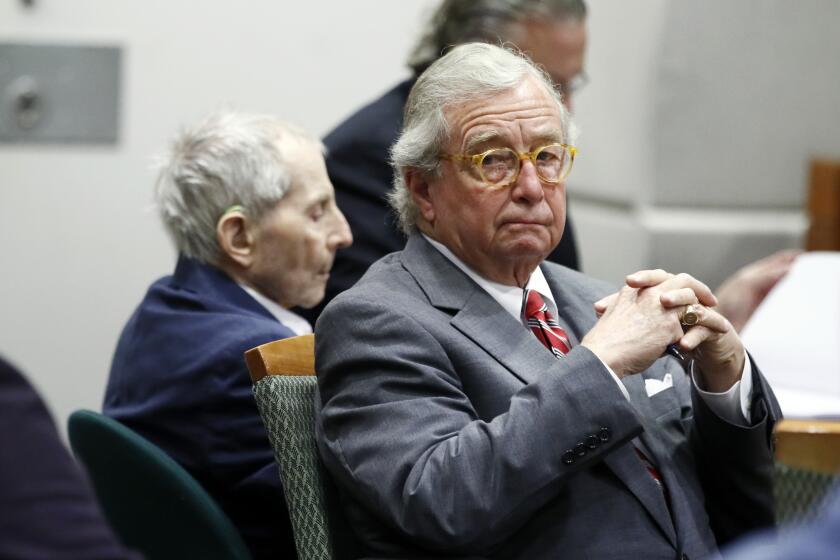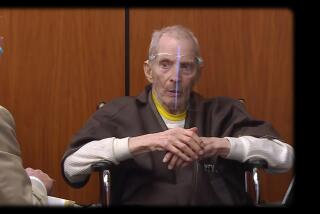A crumbling marriage. A delayed police report. Robert Durst describes wife’s disappearance

- Share via
During his first three days on the stand at his Los Angeles murder trial, Robert Durst laid out how he believed cocaine was eroding his marriage, explained why he waited nearly a week to report his wife missing to police in the 1980s and painted a rosy picture of his relationship with the woman he’s accused of shooting in the head a decade later.
While Durst is only charged with the 2000 murder of his close friend, Susan Berman, prosecutors have argued the real estate scion shot the Las Vegas writer in her home to cover up the vanishing of his first wife, Kathleen. During the nearly three-month presentation of their case, prosecutors called witnesses who claimed Kathleen was terrified of Durst and may have suffered abuse at his hands, while others said Berman knew Durst killed Kathleen and helped him create a false alibi shortly after she went missing.
To counter that narrative, attorney Dick DeGuerin has questioned Durst about Kathleen’s flaws in the crumbling relationship during a combined 12 hours that the 78-year-old spent on the stand this week.
Robert Durst has repeatedly claimed his first wife was dealing with a rapidly worsening cocaine addiction in the months before she vanished. Her drug dependency, he said, was straining their marriage and imperiling her chances of completing medical school.
“Kathy would hide snorting cocaine from me. She kind of drove us to other people,” Durst testified in his distinct hoarse whisper on Wednesday, acknowledging the two both had extramarital affairs before she vanished.
L.A. County prosecutors rested their murder case against Robert Durst in the death of confidante Susan Berman.
Kathleen Durst was last seen on Jan. 31, 1982, when she supposedly boarded a Manhattan-bound train after Durst dropped her off at a rail station in South Salem, N.Y. Durst described his wife as “loaded” that night, claiming she’d driven drunk back to the couple’s home after spending several hours with a close friend, Gilberte Najamy.
The 78-year-old has repeatedly spoken ill of Najamy during his testimony, blaming her for enabling Kathleen’s drug use and referring to her as a “pain in the ass” on Thursday. Najamy, the last person other than Robert Durst to see Kathleen alive, died in 2015.
On the night she vanished, Robert Durst said Kathleen was insistent about returning to New York City. He promised to drive her back in the morning so she could be on time for her pediatric clerkship at the Albert Einstein College of Medicine, but eventually gave in and took her to a nearby train station. Asked by DeGuerin to describe the last moment he saw his wife, Durst admitted he has waffled on his description of events over the years.
“Everybody’s asked me that question and I’ve changed my mind probably a dozen times. She was standing on the platform with half a dozen people ... the people got onto the train, and the train left,” he said. “Did I actually see Kathy walk through the doors and onto the train? The answer is I don’t know … but there’s no place else to go.”
The accuracy of Durst’s description of his wife’s final days has come under scrutiny throughout the trial. Durst originally told police he left the train station that night to have drinks with neighbors, but those neighbors later said Durst was lying, according to the testimony of the original New York City police detective assigned to the case.
Durst admitted to another fiction he offered to the NYPD early in their investigation: that he spoke to Kathy by phone and confirmed she reached their Manhattan apartment after he left her at the train station.
“That was a lie,” Durst admitted on the stand.
In the following days, Durst said he checked the couple’s Upper West Side apartment and found a bottle of soda and an ash tray that was home to a single cigarette butt, but no other sign of Kathy. Despite not hearing from his wife, Durst said he didn’t panic at first because Kathy had been spending more and more nights away from him as their marriage failed.
“Our relationship, as it had gone downhill, she spent more time not coming home,” he said.
Robert Durst found his friend already dead and ran away, his defense attorney said in opening statements of the real estate heir’s L.A. murder trial.
But Durst said he became alarmed after receiving several phone calls from the medical school asking about Kathy’s whereabouts. Four days after he last saw her, Durst said he finally considered contacting the police. But he was dissuaded by his family and lawyers for the Durst real-estate empire, who he said were worried about attracting negative press.
“Dad said he could see the headline in the New York Post,” Durst said.
But Durst eventually traveled to the NYPD’s 20th Precinct and filed a missing persons report. At the same time, concerned friends of Kathleen began raising alarms with the New York State Police, who soon searched the couple’s South Salem home. The tabloids got hold of the story a few days later, according to Durst, who said he started to consider bringing in an old friend to handle media inquiries — Berman.
DeGuerin also spent much of the week quizzing Durst about his relationship with the author and daughter of Vegas mafia royalty. Durst spoke warmly of her, describing them as “close” but bristling any time the lawyer asked if the two had been lovers. He spoke about helping cover her living expenses in Los Angeles, and DeGuerin at one point presented a check Durst had written her to help finance her failed bid to launch a Broadway musical.
In late 2000, with Durst in hiding as New York authorities began to consider him a suspect in his wife’s disappearance, the real estate heir once again reached out to his old confidante. The two planned a Christmas “staycation” in Los Angeles where the pair would “do all the things that tourists do.”
“We were going to go to Catalina Island,” he said. “We were going to go to Disneyland.”
But the trip never happened. In a fashion fitting Durst’s made-for-TV existence, Thursday’s court proceedings ended on a cliffhanger, just before Durst could explain why.
On Monday, Durst is expected to deliver long-awaited testimony that his defense attorneys revealed nearly 18 months ago — that he discovered Berman’s body when he arrived for their planned holiday together, wrote an anonymous note to alert police about her death and then fled.
Durst and his team are likely hoping that admission undercuts one of the most haunting moments from the HBO documentary series that dragged Durst’s case back into the national consciousness, when producers of “The Jinx” found a letter Durst wrote to Berman in 1999 containing identical misspellings to those contained on the so-called cadaver note.
More to Read
Sign up for Essential California
The most important California stories and recommendations in your inbox every morning.
You may occasionally receive promotional content from the Los Angeles Times.













